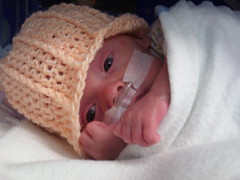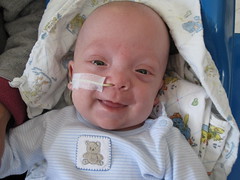Carolyn took Max to Children's for an appointment with the GI service. Because Max's big two challenges are his problems feeding by mouth and his habit of throwing up a lot, we expect the GI service to be a big part of Max's care. Carolyn's experience today was a little disconcerting. She went into the meeting expecting the GI service to identify Max's underlying problem, or at least to lay out a plan for figuring out what the problem is, and then to recommend a course of action to solve the problem. I often fantasize that I'm the CEO of a major company, say MaxCo Inc ("Increasing Your Dry Cleaning Bills Since 2008"), and that the medical and surgical services are my staff. I walk in to the boardroom every morning and demand a rundown on the plan to bring MaxCo to profitability by 2010Q1, like I promised the shareholders. Reality and fantasy didn't diverge much when we were all at the hospital, which had a rigid hierarchy and a clear goal. (And, in truth, given the tab that the real-world Max is running up, he may be generating more revenue than many small businesses these days.)
But we're home now, and I'm cast in the role of a small scale entrepreneur; say, a solar-energy enthusiast or a mortgage broker. No big corporate planning department is going to lay out the three milestones to profitability with appropriate workstreams and interim goals. It's just Carolyn and me trying to piece the puzzle together.
Children's GI service really brought this home. No-one knows, really, why Max is vomiting so much, or why his bottle feeding attempts are trailing off so badly. Moreover, the information Carolyn got from the GI service contradicted information we got from the speech and occupational therapists we've seen. As we expected, the GI service tried to "blame the head", i.e. point to his neurological deficits as the cause of his problems. But beyond that, they didn't have a particular diagnosis, or even really a plan for narrowing down the cause of his problems.
They thought that, perhaps, Max might be getting too much food, as evidenced by the fact that he's gaining weight at the upper end of the normal range. One possibility, they suggested, was to feed him less at night. As an alternative, we could feed him the same amount, but fortify less, so that his food is less rich and hence (I assume) easier to digest. The GI service kept referring to Max's problems as "gagging" as in "perhaps he's gagging on his feeding tube." So they're not even convinced he has reflux. The GI specialists mentioned a type of surgery that we hadn't heard of before: a "peg", which is simple to install and allows access to the stomach through the abdominal wall. Of course, such a device will derange the Angle of His. However, according to the GI specialists, the research on the relationship between stretching the Angle of His from acute to oblique doesn't really support the view that it worsens reflux. Which Max might not have anyway.
In the end, we assembled all of the information and ideas from the GI service and laid them at the feet of Max's pediatrician, the stalwart Dr. J. She called Carolyn back at 9:00 PM tonight and discussed the new information and the options. She agreed that dialing back the fortification was potentially a good step.
Max was absolutely exhausted after his trip up to Children's. He insisted on an early bedtime, and was tucked up and sound asleep by the time I got home from work. I got to go up and give him his 8:00 PM medications, though, and he was extremely cute. Carolyn reports that Max put on his usual display of irresistible charm while at Children's today. However, the hardened professionals of the GI service take a deeply skeptical view of baby charm, perhaps because they are constantly being vomited on by their patients.
skip to main |
skip to sidebar

Max was born in October 2008 at Georgetown University Hospital. After more than four months at GUH, Max moved to the HSC Pediatric Center in March 2009. He came home six months after he was born, in April 2009.
A TUBE-FREE MORNING

Start Here: A list of posts with background information
- We're home! (leaving the hospital with Max)
- The hospital at home (what it's like to care for Max at home)
- Max in action (see Max do his tricks)
- How is Max? (update April 2009)
Most recent photos of Max
Blog Archive
-
▼
2009
(224)
-
▼
May
(24)
- Play is physical therapy
- Max's Tricks
- Cheers!
- Carry-out PT
- Job posting
- The biggest loser
- At the chalk party
- Breakfast scene
- In the bouncy seat, on the deck
- The night shift
- Breakfast on the deck
- Max in action
- A visit to the GI service
- Tube free (for a little while)
- Occupational therapy for babies
- Getting caught in the rain
- How to get a tube-fed baby to take a bottle
- Secrets of the baby whisperer
- The discreet pleasures of the second act
- Thriving at home (so far)
- Another visit to the phrenologists
- Max is babbling a lot more
- The home hospital
- Considering a normal family life
-
▼
May
(24)



